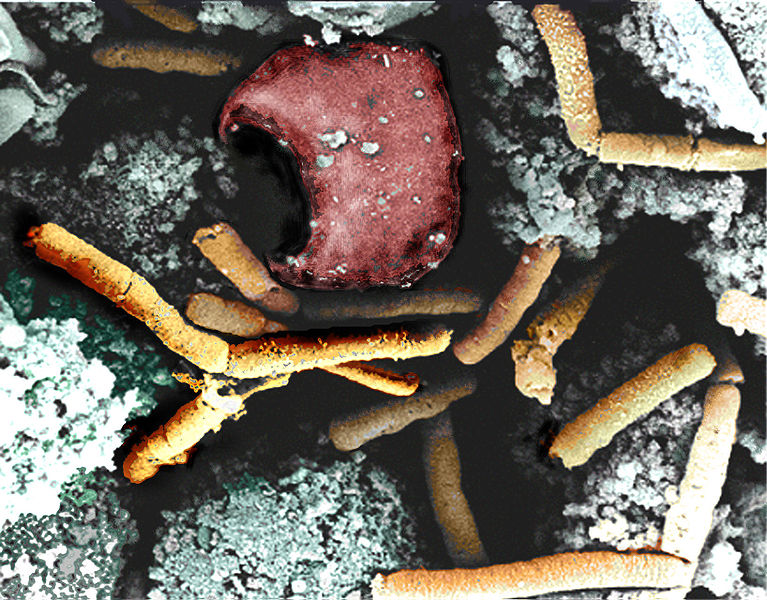 |
Anthrax virus |
Investigation findings run counter to claims earlier that year that only one such sample had been shipped
The US military has shipped inactivated samples of anthrax to South Korea no fewer than 16 times since 2009 for training and testing, and this year it brought in bubonic plague once, investigators confirmed.
This gives the lie to claims made by US forces in South Korea that this year was the first time they had conducted such training.
These were some of the results of a joint investigation by Seoul and Washington that were announced on Dec. 17 at a joint press conference at Combined Forces Command in Seoul’s Yongsan istrict. The press conference was held by Major General Chang Kyung-soo, head of policy planning for South Korea’s Defense Ministry, and Major General Robert F. Hedelund, commander of US Marine Corps Forces in South Korea.
“We have confirmed that US forces shipped test samples of anthrax and test samples of the plague this year and that they shipped inactivated test samples of anthrax on a total of 15 occasions between 2009 and last year to test equipment and train operators,” Chang said. The implication is that the US military brought anthrax into South Korea on 16 occasions and the plague on one occasion.
The controversy over US military shipments of anthrax samples was triggered by the news on May 28 that the Pentagon had sent possibly active samples of anthrax from the US Army‘s Edgewood Chemical Biological Center (ECBC) to military labs around the world, including one at the Osan Air Base in South Korea.
The same day, the US military issued a press release in which it stated that anthrax samples had been brought into South Korea for training in biological warfare defense. The US also claimed that it had safely disposed of the test samples after determining that they might not have been inactivated, that no one had been infected, and that this was the first time this training had taken place.
After other questions were raised subsequently about whether samples of anthrax had also been brought into South Korea in the past and whether the shipments included not only anthrax but also other bacteria, the US military had declined to comment, citing the ongoing investigation. Instead, the South Korean Defense Ministry and US military agreed to hold a joint investigation and set up a working group for this purpose in July.
But the results of this joint investigation, which lasted five months, show that the US military claims were essentially false. Investigators found that the US military had shipped inactivated anthrax to South Korea on 15 occasions for testing through last year and that it had brought in not only anthrax but also bubonic plague this year.
Investigators also turned up the fact that the US military had brought anthrax not only onto Osan Air Base but also onto the Yongsan Base in Seoul and carried out tests there several times.
“It turns out that, until last year, the US military was bringing anthrax onto Yongsan Base for testing, and that this was the first year that they brought it to Osan Air base for testing,” said an official with South Korea’s Defense Ministry.
Since the laboratory on the Yongsan Base is located in a military hospital on the base that is currently closed, the investigators were reportedly unable to visit the scene in person.
The shipments of inactivated anthrax and plague were 1ml in size, investigators found.
Investigators confirmed that the anthrax samples had been safely sterilized and destroyed this past May in line with procedures and protocol and that no one had been infected.
However, the investigators found that the US military had not notified the South Korean government of the sample shipments and recommended that the SOFA (Status of Forces Agreement) Joint Committee require the US military to submit documentation before shipping samples of biological agents for testing.
Currently, Article 9 of SOFA states that cargo consigned to the US military is exempt from customs inspections by the South Korean government.
As a result, the US and South Korean governments held a meeting of the SOFA Joint Committee at the Yongsan Base in Seoul on Thursday afternoon and accepted the recommendation of the team of investigators.
The recommendation states that, when the US military wants to ship samples for testing, it must provide the South Korean government with advance notification of the organizations sending and receiving the samples; the categories, usage, and amount of the samples; and the method of shipping. The recommendation also requires that the US and South Korea move quickly to conduct a joint assessment of requests made by either side and permits the Korea Custom Service, if it so wishes, to work with the US military‘s bureau of customs investigations to inspect items.
By Park Byong-su, senior staff writer
Please direct questions or comments to [english@hani.co.kr]
english.hani.co.kr/arti/english_edition/e_international/722554.html

